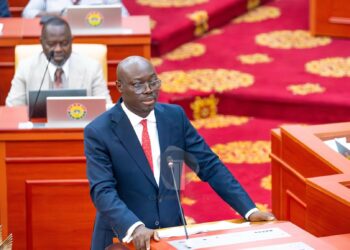Dr. Sajid Chaudhry, Senior Lecturer in Economics, Finance, and Entrepreneurship at Aston Business School, Aston University-United Kingdom, has proposed a targeted and nuanced bank tax.
The Senior lecturer expressed belief that the move should be part of a larger plan to overhaul the local banking industry and promote financial stability, while also producing consistent revenue for the government.
“A bank tax will provide Ghana with a sustained source of revenue with attempts to move the country’s economy beyond dependence on aid, and will further help reduce the budget deficit.
“Ghanaian banks are too profitable (in terms of what is socially optimal) and they earn much higher profits compared to other industries, with most of the profits coming from investments in Treasury securities.”
Dr. Sajid Chaudhry
Dr. Chaudhry’s tax concept has two major components. He recommended two methods for taxing large banks with at least GHC 7billion in assets.
The first is a 2% tax on their total liabilities after subtracting equity and insured deposits. The second alternative he suggested was to levy a 10% tax on their profits before taxes, whichever is greater, adding that “this tax would be in effect in the long run.”
According to him, the purpose of this revenue line is to foster more stable and long-term funding methods in the banking sector.
“A tax on total liabilities net of equity and insured deposits will act as a catalyst for banks to reduce reliance on short-term funding sources, and help reduce bank risk in the long-term”
Dr. Sajid Chaudhry
More so, in the short term, Dr. Chaudhry advocated a 10% tax on investments in Treasury securities at the present rate. This tax, he said, would be half the existing rate on 91-day Treasury bills and would help to reduce banks’ reliance on Treasury securities as a key source of income.

According to the economist, this tax on Treasury securities would generate around GH5.34 billion in the short run.
Dr. Chaudhry emphasised the potential benefits of the bank tax, stating: “The tax on liabilities will particularly be helpful when banks are bigger, riskier and earning even more profit in the future.”
Some analysts have however raised concerns about the taxes that these institutions are subjected to, particularly in the light of recent developments.
Already, banks pay the general corporate income tax (CIT) rate of 25 percent. This is in addition to the Financial Sector Recovery Levy of 5 percent on their pre-tax profit as well as 5 percent of the same profit as Growth and Sustainability Levy, which has succeeded the National Fiscal Stabilisation Levy.
Banking Consultant Counters Dr. Chaudhry Proposal
In response to the proposal plan made by Dr. Sajid Chaudhry, Dr. Richmond Atuahene, a banking specialist, stated that it would not be the best course of action now or in the near future.
“The banks were already paying three main types of taxes, but with the DDEP losses they will not be able to pay all three taxes. The proposal to pay additional taxes is not feasible at all.”
Dr. Richmond Atuahene

Dr. Atuahene warned about the economic consequences of heavy taxes.
“It feels quite unfair to push these taxes which seem punitive. The banks continue to operate in a volatile environment. When there is an upside, we want to tax everything off them. Now that they need to recapitalise, will the tax authorities do that for them? We need to be careful about the signals we are sending to businesses.”
Dr. Richmond Atuahene
According to the former banking instructor, excessive taxation on businesses in finance, telecommunications, and extractives reflects a failure to address the fundamental issues.
He proposed creating a favorable atmosphere that will allow for higher credit to be supplied to the real sector, resulting in more flourishing enterprises that can then be taxed moderately.
“What we should be focusing on is bringing interest rates down and providing an environment wherein long-term capital can be given to businesses. When these businesses grow, the tax base will invariably grow.”
Dr. Richmond Atuahene
Read also: World Bank Confirms Government’s Effective Use Of Covid-19 Fund





















